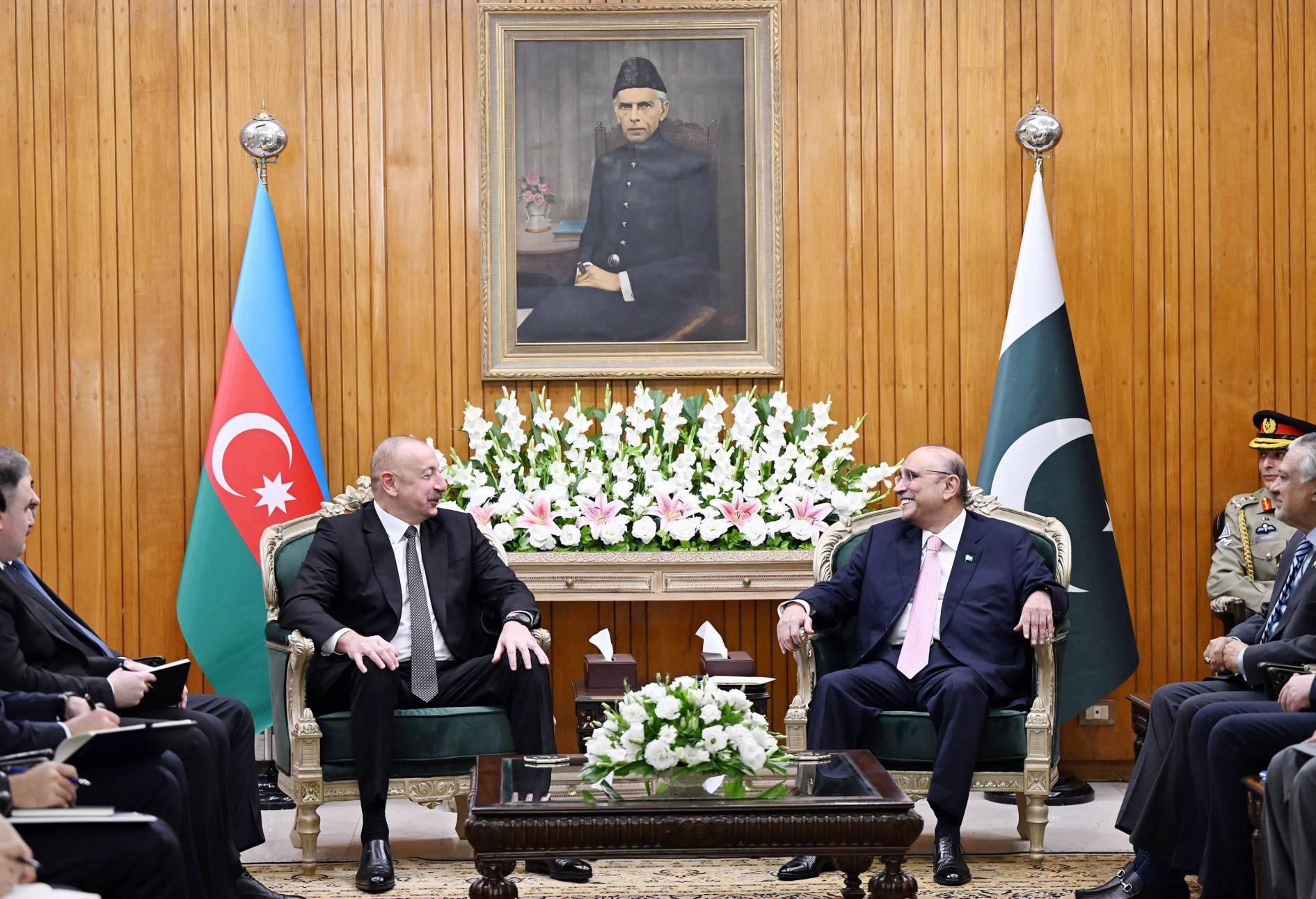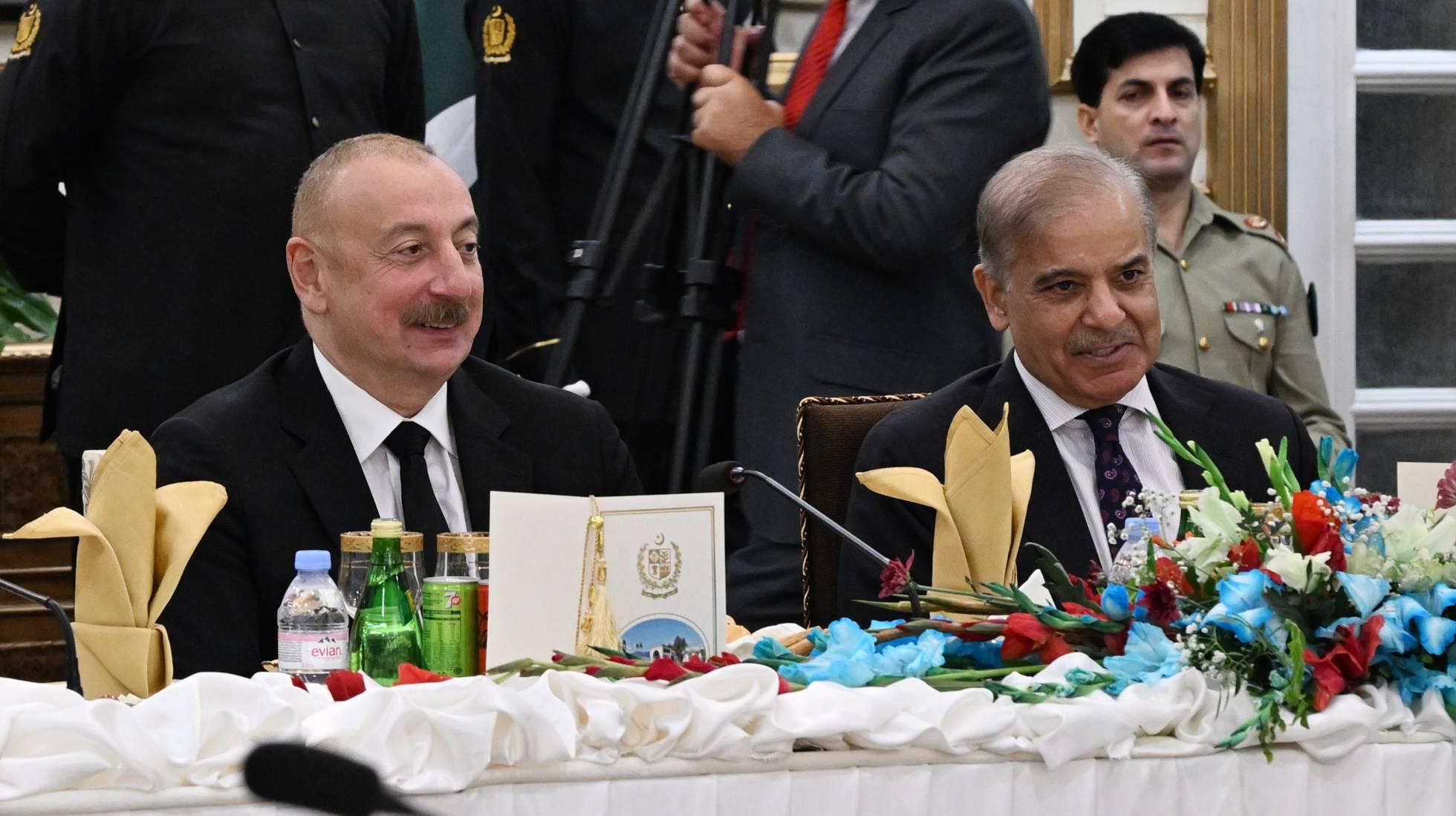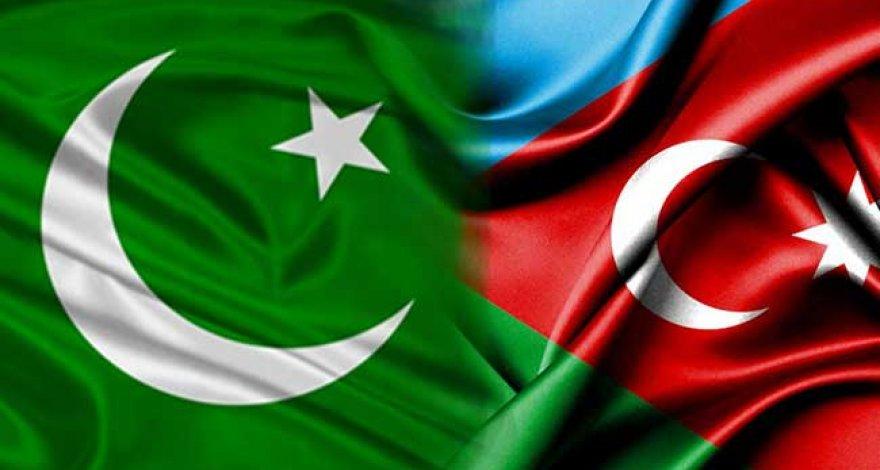Azerbaijan-Pakistan forge deeper bonds Strengthening centuries-old brotherhood
On July 11, the state visit of Azerbaijani President Ilham Aliyev to Pakistan began. The host country did everything possible to emphasize the special status of this visit. After President Aliyev's plane entered Pakistani airspace, it was met by fighter jets of the Pakistani Air Force, which escorted the honorary guest's aircraft until it landed as a sign of special respect. At the Nur Khan Airbase, the Azerbaijani President was greeted by Pakistani Prime Minister Muhammad Shehbaz Sharif. An honour guard was formed in honour of the guest, and a gun salute was arranged.
Such a solemn meeting format is far from accidental. Following the negotiations with Muhammad Shehbaz Sharif, Ilham Aliyev announced that Azerbaijan plans to invest significant funds in Pakistan's economy: "The initial amount of investments, which we're planning to accumulate, as my brother mentioned, is around 2 billion US dollars. We already reviewed several projects in the area of energy, infrastructure, connectivity, and many others including the defence industry where we are cooperating very successfully."

The President of Azerbaijan also met and held negotiations with the President of Pakistan, Asif Ali Zardari. The outcome of the visit, which concluded on July 12, included the signing of 15 documents on cooperation in air communications, tourism, transit trade, science and technology, mineral resources and geology, small and medium-sized businesses, information technology, and privatization.
The Foreign Ministries of Azerbaijan and Pakistan signed an agreement on cooperation in consular affairs, and Baku and Pakistan will establish sister-city connections. The parties also "aligned their clocks" on current foreign policy issues. Ilham Aliyev noted that Pakistan and Türkiye are countries that have always supported Azerbaijan on the Karabakh issue. Azerbaijan has unique relations with these two countries, adding that Islamabad has not established diplomatic relations with Yerevan solely because of the Karabakh issue. Addressing the Kashmir issue, President Aliyev remarked that Baku's position is based on respect for international law and justice. “We, as brothers and friends, will always stand side by side with you, with our brothers in Kashmir, with international law, with justice. And I'm sure justice will prevail," Aliyev said.
Prime Minister Sharif thanked the President of Azerbaijan for his consistent stance and noted that the countries will support each other at all regional forums on the issues of Karabakh and Kashmir.

The relations between Azerbaijan and Pakistan have a centuries-old history. Since the times of the great Muslim empires of medieval times—the Ghaznavid state, the Delhi Sultanate, and the Mughal Empire—many people from the territory of modern Azerbaijan migrated eastward within a shared economic, political, and cultural space. In the territory of modern Pakistan, there are people whose names and surnames are based on Azerbaijani toponyms such as Tabriz, Nakhchivan, and Shirvan. A significant Azerbaijani-Turkic tribal association, the Qizilbash, settled in Pakistan, playing an important role in the genesis of the Safavid state. Descendants of the Qizilbash later produced many prominent social, military, and political figures in Pakistan.
Fateh Ali Khan Qizilbash (1862-1923) was a prominent politician, cultural figure, and philanthropist. In Lahore, he established educational institutions, a hospital, and was a prominent enlightener, serving as the president of the Punjab Leaders' Society and the Punjab Muslim League. Aga Muhammad Yahya Khan Qizilbash (1917-1980) became the third President of Pakistan. Muzaffar Ali Khan Qizilbash held positions as Minister of Finance and Trade during the 1950s and 1960s. Azerbaijani philanthropist of the late 19th to early 20th century, Haji Zeynalabdin Taghiyev, during a plague epidemic in modern-day Pakistan, sent over 100,000 vaccine ampoules to aid in combating the disease, thus saving thousands of lives.
The relations between Azerbaijan and Pakistan have a centuries-old history. Since the times of the great Muslim empires of medieval times—the Ghaznavid state, the Delhi Sultanate, and the Mughal Empire—many people from the territory of modern Azerbaijan migrated eastward within a shared economic, political, and cultural space. In the territory of modern Pakistan, there are people whose names and surnames are based on Azerbaijani toponyms such as Tabriz, Nakhchivan, and Shirvan. A significant Azerbaijani-Turkic tribal association, the Qizilbash, settled in Pakistan, playing an important role in the genesis of the Safavid state. Descendants of the Qizilbash later produced many prominent social, military, and political figures in Pakistan.
Fateh Ali Khan Qizilbash (1862-1923) was a prominent politician, cultural figure, and philanthropist. In Lahore, he established educational institutions, a hospital, and was a prominent enlightener, serving as the president of the Punjab Leaders' Society and the Punjab Muslim League. Aga Muhammad Yahya Khan Qizilbash (1917-1980) became the third President of Pakistan. Muzaffar Ali Khan Qizilbash held positions as Minister of Finance and Trade during the 1950s and 1960s. Azerbaijani philanthropist of the late 19th to early 20th century, Haji Zeynalabdin Taghiyev, during a plague epidemic in modern-day Pakistan, sent over 100,000 vaccine ampoules to aid in combating the disease, thus saving thousands of lives.
Subsequently, Pakistan became the third country after Türkiye and Romania to recognize Azerbaijan's independence on December 13, 1991. Diplomatic relations between the two states were established on June 9, 1992, and since then, the strength of Azerbaijani-Pakistani ties, united by common cultural, religious, and political interests, has been unquestioned.
Modern Pakistan is a strong regional player, a multiethnic, populous, religiously homogeneous state with nuclear capabilities, situated at the intersection of interests of powerful players such as India, China, Iran, the United States, and Russia. An interesting feature of Pakistan is the significant role of women in the country's domestic politics, with 60 seats allocated to them out of 342 in the lower house of parliament. Benazir Bhutto served as Prime Minister of Pakistan twice. Following the withdrawal of the United States and its allies from Afghanistan in 2021, Pakistan's importance in the region has increased.
Traditionally, the cornerstone of Pakistani policy is its conflict with India. This dispute extends beyond Kashmir and is rooted in deep historical, religious, and ideological differences. For a long time, both countries were part of British India, and Pakistanis are keen to demonstrate that they are not merely a "seceded Muslim province of Delhi." The religious and Muslim identity has become central to Pakistan.
The confrontation with India, which has led to several wars, has drawn Islamabad closer to Beijing, traditionally causing dissatisfaction in Delhi. Pakistan is thus a traditional partner of the United States, although there have been periods of cooling in relations. Pakistan is also home to a significant Shia minority, which contributes to closer ties with Iran.

By the way, Islamabad views its alliance with Baku partly through the prism of its rivalry with India. In recent months, there has been active military-technical cooperation between Delhi and Yerevan. The government of Prime Minister Narendra Modi has launched a new industrialization program in India under the motto "Atmanirbhar Bharat" or "Self-reliant India." This initiative aims at localizing production, including the development of the defence industry. The next stage of Indian plans involves exporting industrial products, and here Delhi has found a potential partner. After military setbacks, Armenia has been increasing its military arsenals and has shown interest in purchasing Indian weaponry, which may not be of the highest quality but is certainly cost-effective. For the Indian defence industry, the contract with Yerevan marks a breakthrough and a demonstrative entry into the South Caucasus market.
In this situation, it is advantageous for Pakistan to develop military cooperation with Azerbaijan. According to Pakistani expert Mehmood Ul Hassan Khan, "the current visit of Azerbaijani President Ilham Aliyev will further strengthen bilateral ties between the countries."
To conclude the article, I would like to quote Ilham Aliyev's words spoken in Islamabad: "We are brothers. We are friends. Our brotherhood is based on deep feelings between our peoples towards each other, which go back to centuries."
The views and opinions expressed by guest columnists in their op-eds may differ from and do not necessarily reflect the views of the editorial staff.








